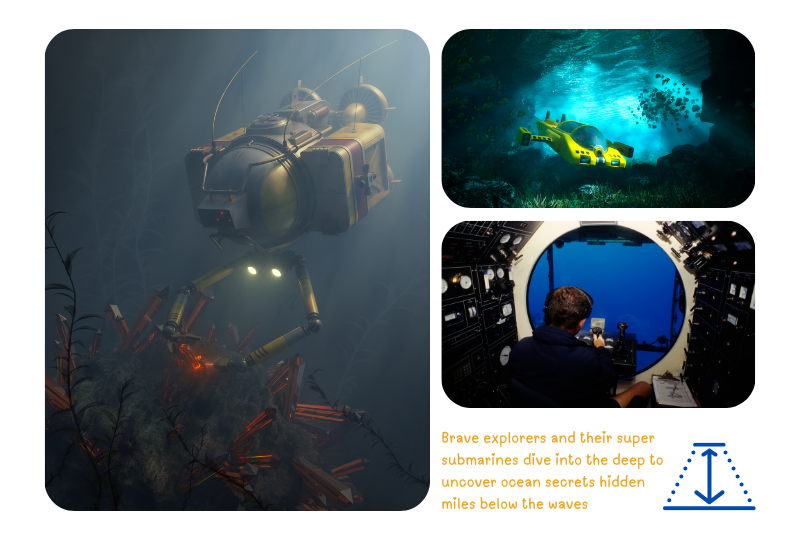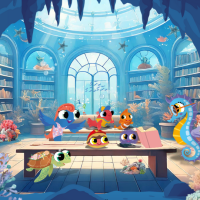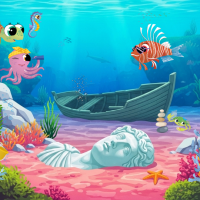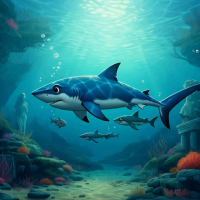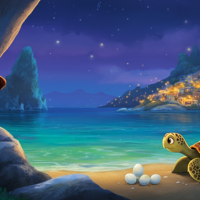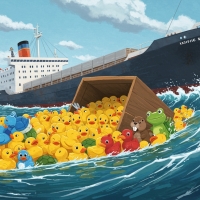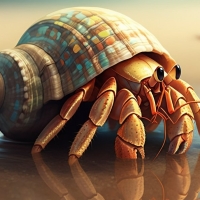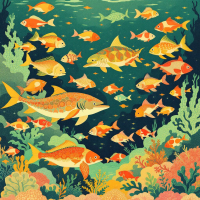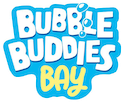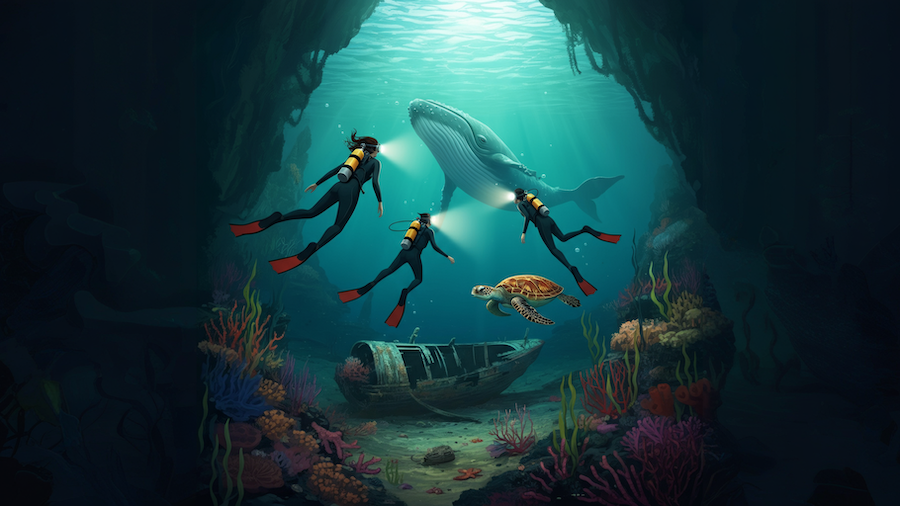
The Science Behind Saving the Ocean
Hello, Bubble Buddies! Today, I want to tell you about some super real ocean heroes: scientists who work like amazing sea doctors! They protect the ocean and all the wonderful creatures who live in it, including me! Their incredible work is called Marine Conservation. Sounds fancy, right? It means keeping our whole ocean world safe and sound!
Who are These People in Goggles?
Meet the Ocean Superheroes They may not wear capes, but ocean scientists have some super clever jobs:
The Creature Investigators - Marine Biologists: These scientists study everything from the tiniest floating plankton to gigantic lumbering whales! They tag sea turtles, listen to dolphin whistles, and even track what fish gobble up for lunch. They try to figure out how ocean creatures live, move, eat, and survive, and what messes up their lives!
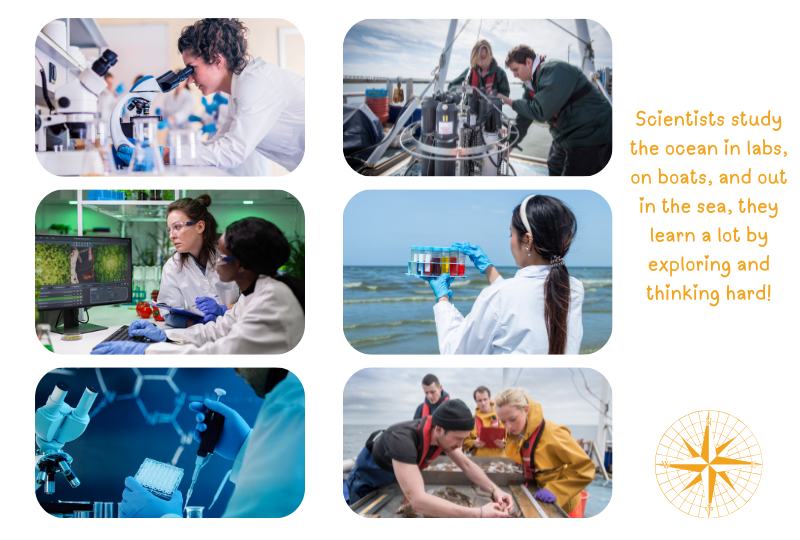
The Ocean Movers and Shakers - Oceanographers: Oceanographers are interested in the water itself! They measure how currents push water around, how salty it is, and how warm or cold it gets. They also study how the seabed (that's the ocean floor!) shifts or where pollution flows. It's like mixing up a big potion of chemistry, physics, and maps to understand the ocean's secret moves!
The Ecosystem Inspectors - Ecologists: Ecologists look at the whole ocean neighbourhood! They study how colourful coral reefs help support fish, how seaweed feeds tiny grazers, and what happens when the balance gets a little wonky. If a fish party gets too wild, the ecologist is there to take notes and figure out how to help!
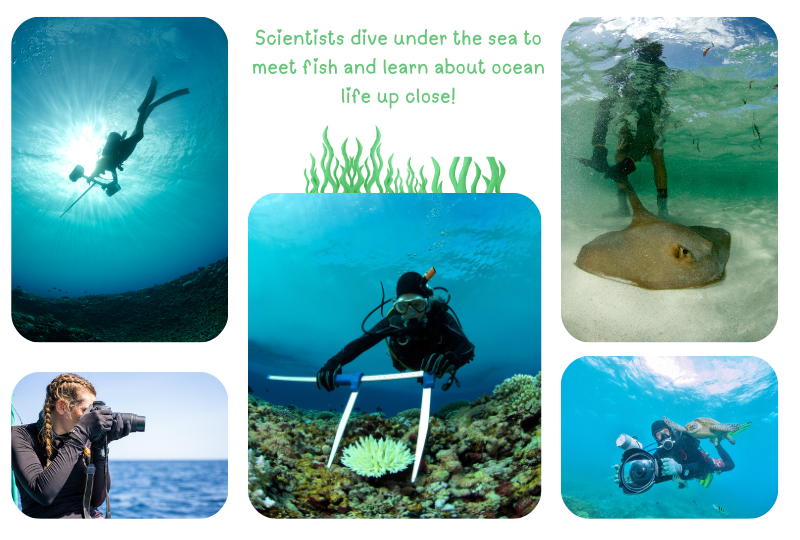
The Fish Counters - Fisheries Scientists: These experts make sure people don't scoop up too many fish at once! They help design clever fishing gear that lets little fish escape, and they suggest when fish need a break from being someone's dinner.
How They Explore
Being an ocean scientist means using some super exciting gear:
Research ships act like giant floating labs! They collect samples, study currents, and even launch cool mini-submarines.
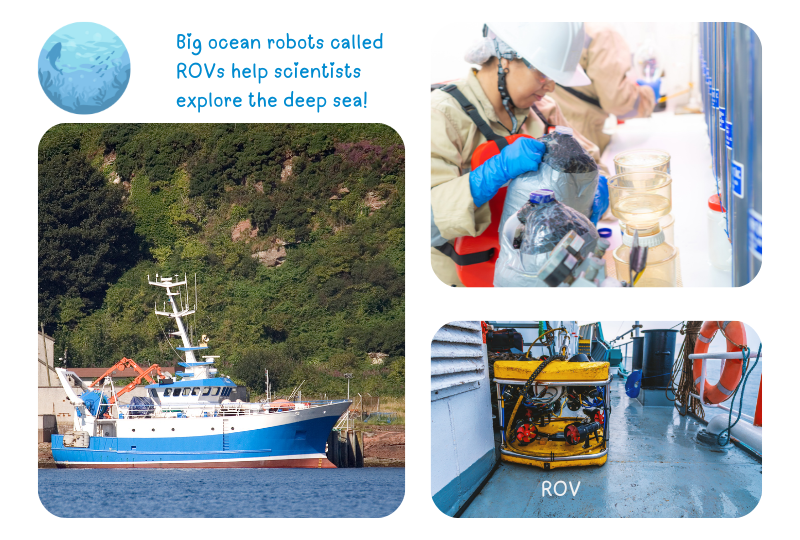
Submarines and ROVs (that's Remotely Operated Vehicles, like awesome underwater robots!) dive deep where humans can't go. They discover animals that glow, squish, or look like they belong in outer space!
Tracking tags let scientists follow sharks or sea turtles all across the ocean, like nature’s version of a secret GPS tracker!
Water testers check the water's temperature, how fizzy (acidic) it is, and pollution levels. Basically, they take the ocean’s pulse to see if it's healthy!
What Do Ocean Scientists Figure Out?
Scientists use their findings to help the ocean recover and stay healthy. For example:
They set up safe zones where sea life can rest and grow without being disturbed by people or big boats.
They help write fishing rules so we don’t run out of yummy fish for dinner!
They help clean up ocean messes by tracing plastic pollution back to where it comes from and testing new clean-up ideas.
They help figure out climate changes by tracking how rising temperatures affect sea animals and our beautiful coastlines.
Ocean Scientists' Coolest Discoveries (You'll Want to Tell Everyone!)
Plankton Party in a Bucket! One scientist once discovered over 1,000 new kinds of plankton from just one bucket of seawater! Imagine scooping up soup and finding a whole zoo inside!
Plastic at the Deepest Spot! Deep-sea explorers once found plastic at the very bottom of the Mariana Trench! That's nearly 11,000 meters deep, deeper than Mount Everest is tall! It showed scientists just how far pollution can travel and why we really need to stop it.
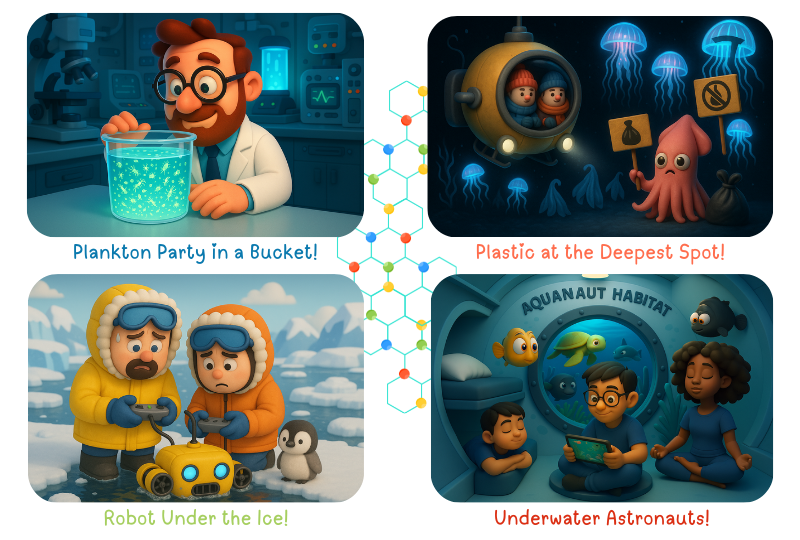
Robot Under the Ice! The first robot to explore under Antarctic ice was tested by scientists lying on a frozen lake! They had to slide it under the ice using a hole only the size of a pizza. It worked, and it helped them learn about life in icy waters!
Underwater Astronauts! Marine scientists sometimes spend weeks living underwater in special pods called 'aquanaut habitats'! They get to sleep, eat, and research right under the sea, just like amazing underwater astronauts!
Real Discoveries That Sound Made Up (But Aren’t!)
The "Dumbo" Octopus: Discovered way down at 7,000 meters below the surface, this adorable little octopus flaps ear-like fins just like a cartoon elephant! It lives where the ocean pressure is super crushing, but it glides around as if it were floating happily in a bathtub.
The Ghost Fish: In 2016, scientists using a deep-sea robot saw a ghostly white fish drifting silently in the darkness near Hawaii. It had never been seen alive before! It had no big eyes, no bright colours, just drifting, like something straight out of a beautiful, mysterious dream.
The Sponge the Size of a Minivan: Also near Hawaii, scientists found a sponge bigger than a grown-up person, it was like a giant, soft minivan! It was as squishy as jelly and had been growing silently for who knows how long. It might even be the oldest living creature in that whole ocean area! It does nothing but sit still and filter water, but what a record-breaker!
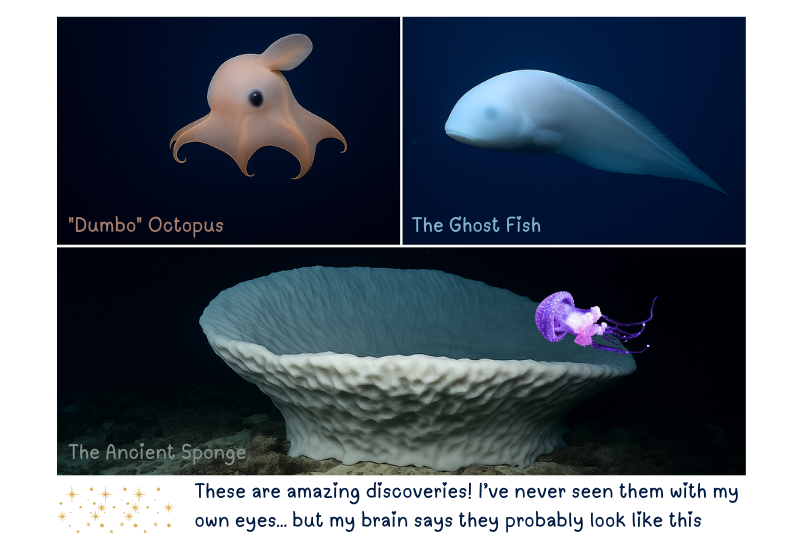
The Ocean is Doing Its Best, Let's Do Ours.
Our ocean is doing its best, Bubble Buddies!
Scientists are working super hard to protect my home. But the ocean is changing fast, it's getting warmer, a bit saltier, and sometimes messier.
It needs a big team of clever helpers.
And guess what? That includes you, Bubble Buddies!
Ocean Hero Pledge: What will you do today to protect the sea?
Want to Join the Team? Try These Ocean Challenges:
🤿 Sea Creature Researcher: Pick your favourite sea animal and become its personal investigator! Can you dig up five super weird or amazing facts about it? Share them at dinner and surprise everyone!
🤿 Animal Tracker: With a grown-up's help, find a real website that follows sea turtles or whales! Watch their incredible journeys as they travel across the ocean. Can you guess why scientists track them?
🤿 Ocean Currents in a Bottle! Ever wonder how ocean currents work? You can make your own mini-ocean right in a bottle!
- How to play: Get a clear bottle (like a clean soda bottle) and fill it mostly with water. Now, with a grown-up's help, add a little bit of warm water mixed with red food colouring to one side, and some cold water mixed with blue food colouring to the other side. Watch closely! The warm water will rise, and the cold water will sink, showing you how currents move heat around the ocean! You can even add a tiny drop of oil to see how it sits on top.
- What you learn: How ocean water moves and carries heat around the planet!
🤿 Pollution Investigation Station! Let's be pollution detectives and see what happens when yucky stuff gets into our water.
- How to play: Get a few clear cups or jars. Fill them with water (this is your "ocean water"). Now, for each cup, add a different "pollutant": maybe a little bit of dirt in one, some tiny bits of torn paper in another, and maybe some glitter (to be like tiny plastics!) in a third. What happens to the water? Does it get cloudy? Does stuff float or sink? Discuss with a grown-up how difficult it would be to clean up real pollution in the ocean.
- What you learn: How different types of pollution affect water and why it's so important to keep it clean!
🤿 "What Belongs Where?" Habitat Sort! The ocean has many different neighbourhoods. Can you put the right animals in the right homes?
- How to play: Ask a grown-up to help you draw or print pictures of different ocean habitats (like a colourful coral reef, a dark deep sea, a sandy beach, or a kelp forest). Then, draw or print lots of different ocean animals. Now, become an Ocean Ecologist! Sort all the animals to their correct habitat. Does a clownfish live in the deep sea or a coral reef? Does a hermit crab live on a sandy beach or in a kelp forest?
- What you learn: Where different sea creatures live and why their homes are special!
Keep exploring, keep protecting, and I'll see you in the waves!
Sophia the Seahorse

